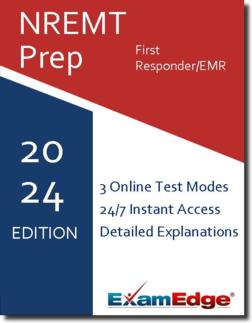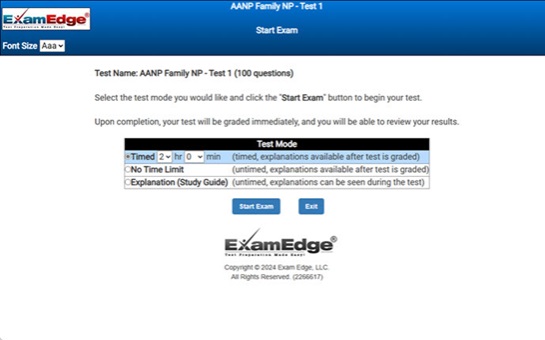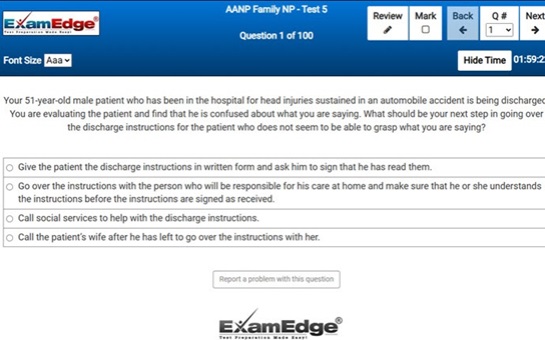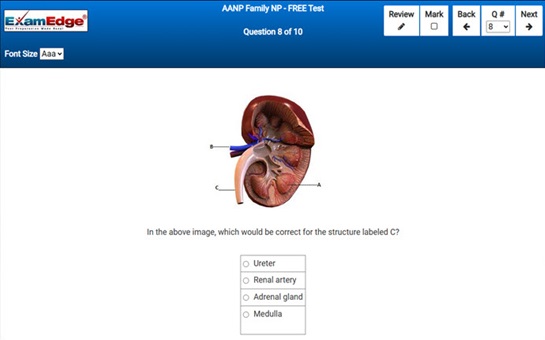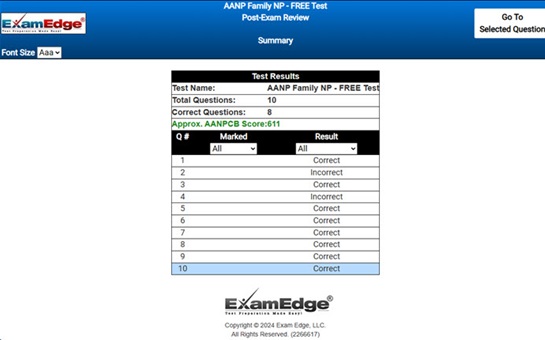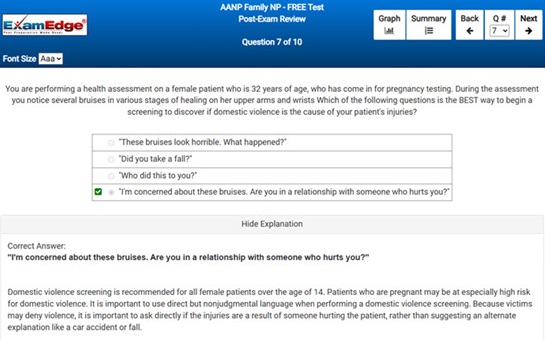NREMT First Responder / EMR (EMR) Practice Tests & Test Prep by Exam Edge - FAQ
Get Instant Online Access Now!
** Sample images, content may not apply to your exam **
Looking for more information about the exam? Check out our NREMT First Responder / EMR FAQs
Our practice tests are designed to help you master both the subject matter and the art of test-taking. Created to mimic the real exam, our practice tests feature:
- Instant access to your online practice tests - available 24/7
- Timed, untimed, and "study guide" modes
- Detailed explanations for each question
- 20 online practice exams - That's 2,000 unique questions
Review the information below and if you have any additional questions about NREMT First Responder / EMR practice tests that have not been answered here, Click her to contact Exam Edge Support.
Select Your Test Bundle
Excellent
NREMT First Responder / EMR (EMR) Shortcuts
General Exam Info
Exam Topics
Features
Study Plan Tips
Test Reviews
Why Exam Edge?
FAQ
Take a FREE Test
Why should I use Exam Edge to prepare for the NREMT First Responder / EMR Exam?
FAQ's for Exam Edge NREMT First Responder / EMR practice tests
We have ten great reasons why Exam Edge is the #1 source on the internet when it comes to preparing for NREMT First Responder / EMR test:
- Comprehensive content: Exam Edge's NREMT First Responder / EMR practice tests are created specifically to prepare you for the real exam. All our NREMT First Responder / EMR practice test questions parallel the topics covered on the real test. The topics themselves are covered in the same proportions as the real test too, based on outlines provided by the National Registry of Emergency Medical Technicians in their NREMT First Responder / EMR test guidelines.
- Realistic practice: Our NREMT First Responder / EMR practice exams are designed to help familiarize you with the real test. With the same time limits as the real exam, our practice tests enable you to practice your pacing and time management ahead of test day.
- Detailed explanations: As you complete your practice tests, we show you which questions you answered correctly and which ones you answered incorrectly, in addition to providing you with detailed step-by-step explanations for every single NREMT First Responder / EMR practice exam question.
- Performance insights: After you complete a practice test, we provide you with your raw score (how many you answered correctly) and our estimate of the NREMT First Responder / EMR score you would have received if you had taken the real test.
- Ease of access: Because all our practice tests are web-based, there is no software to install. You can take NREMT First Responder / EMR practice exams on any device with access to the internet, at any time.
- Flexible use: If you must pause while taking one of our practice tests, you can continue right where you left off. When you continue the test, you will start exactly where you were, and with the same amount of time you had remaining.
- Thousands of unique questions: We offer 20 different online practice exams with 2,000 unique questions to help you prepare for your NREMT First Responder / EMR !
- Low cost: The cost of ordering 5 practice tests is less than the cost of taking the real NREMT First Responder / EMR test. In other words, it would be less expensive to order 5 practice tests than to retake the real NREMT First Responder / EMR exam!
- Our trusted reputation: As a fully accredited member of the Better Business Bureau, we uphold the highest level of business standards. You can rest assured that we maintain all of the BBB Standards for Trust.
- Additional support: If you need additional help, we offer specialized tutoring. Our tutors are trained to help prepare you for success on the NREMT First Responder / EMR exam.
What score do I need to pass the NREMT First Responder / EMR Exam?
To pass the NREMT First Responder / EMR test you need a score of 70.
The range of possible scores is 0 to 100.
How do I know the practice tests are reflective of the actual NREMT First Responder / EMR ?
At Exam Edge, we are proud to invest time and effort to make sure that our practice tests are as realistic as possible. Our practice tests help you prepare by replicating key qualities of the real test, including:
- The topics covered
- The level of difficulty
- The maximum time-limit
- The look and feel of navigating the exam
Do you offer practice tests for other National Registry of Emergency Medical Technicians subjects?
Yes! We offer practice tests for 6 different exam subjects, and there are 80 unique exams utilizing 7800 practice exam questions. Every subject has a free sample practice test you can try too!
EMT Intermediate 85 (NREMT-I85)
Practice Tests
EMT Intermediate 99 (NREMT-I)
Practice Tests
NREMT First Responder / EMR (EMR)
Practice Tests
NREMT EMT Advanced (EMT-Advanced)
Practice Tests
NREMT EMT Basic (EMT-Basic)
Practice Tests
NREMT Paramedic Exam (NREMT-P)
Practice Tests
To order tests, or take a sample test, for a different subject:
Click on ' Name on the Exam Name' You will be take to the orders page
How do I register for the real National Registry of Emergency Medical Technicians?
For up-to-date information about registration for the National Registry of Emergency Medical Technicians, refer to the National Registry of Emergency Medical Technicians website.
What are the NREMT exams?
Congratulations on your decision to become an EMS professional! The National Registry of Emergency Medical Technicians (NREMT) certification exams are your next hurdle. Exactly what can you expect with the NREMT exams?
The National Registry of Emergency Medical Technicians (NREMT)
The National Registry's mission is to provide a valid, uniform process to assess the knowledge and skills required for competent practice by EMS professionals. Certification is one component of public protection. The tests address content areas defined and validated by subject-matter experts, educators, and individuals working in EMS fields. The cognitive, computer adaptive test (CAT) is used in conjunction with other indicators of training and experience in the granting of certification.
Each NREMT CAT test is individualized in that each subsequent question is dependent on how the previous question was scored. The test gets progressively harder as you do better. The test is designed to maintain a level of difficulty that is above a certain threshold rather than a minimum percentage of correct answers. Because of the adaptive format of the exam, the number of questions can range from 70 to 120 to be completed within 2 hours. The AEMT and Paramedic exams allow 2 ½ hours to complete 80 to 150 questions.
In order to pass, candidates must meet a standard level of competency defined by the ability to provide safe and effective entry level emergency medical care. Results are not released at the test center or over the phone. Results will be posted to your National Registry Account usually within 2 business days following completion of the exam.
Specific information for each of the certification exams, including content and registration access, can be found at www.nremt.org.
NREMT First Responder / EMR - FAQ Sample Questions
|
|
|
|

